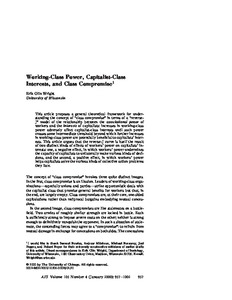Working-class power, capitalist-class interests, and class compromise

2000
105
4
957-1002
capitalism ; interest group ; social class ; theoretical analysis ; working class
Social sciences
http://dx.doi.org/10.1086/210397
English
"This article proposes a general theoretical framework for understanding the concept of “class compromise ” in terms of a “reverse-J ” model of the relationship between the associational power of workers and the interests of capitalists: increases in working-class power adversely affect capitalist-class interests until such power crosses some intermediate threshold beyond which further increases in working-class power are potentially beneficial to capitalists ' interests. This article argues that the reverse-J curve is itself the result of two distinct kinds of effects of workers ' power on capitalists ' interests: one, a negative effect, in which workers ' power undermines the capacity of capitalists to unilaterally make various kinds of decisions, and the second, a positive effect, in which workers ' power helps capitalists solve the various kinds of collective action problems they face. The concept of “class compromise ” invokes three quite distinct images."
Digital
The ETUI is co-funded by the European Union. Views and opinions expressed are however those of the author(s) only and do not necessarily reflect those of the European Union or the ETUI.